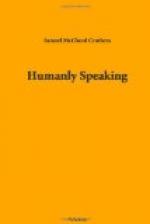“I heard a poet answer
Aloud and cheerfully,
’Say on, sweet Sphinx! thy dirges
Are pleasant songs to me.’
* * * * *
“Uprose the merry Sphinx,
And crouched no more in stone;
She melted into purple cloud.
She silvered in the moon.”
This conception of the merry Sphinx may seem strange to the dyspeptic philosopher pondering on the inscrutableness of the universe. But the prospectors in the mining camps of the Far West, and the builders of new cities understand what Emerson meant. Their experience of the ups and downs of fortune has taught them how to find pleasure in uncertainty. You never can tell how anything will turn out till you try. That’s the fun of it. They are quite ready to believe that the same thing holds good in the higher life.
Or take the lines on “Worship.” How can Worship be personified? Emerson’s picture is not that of a patriarch on bended knee; it is that of a vigorous youth picking himself up after he has been knocked down by his antagonist.
“This is he, who, felled by foes,
Sprung harmless up, refreshed by
blows.”
Religion is a kind of spiritual resilience. It is that which makes a man come back with new vigor to his work after his first failure. It is the ability to make a new beginning.
In Emerson the American hurry is transformed into something of spiritual significance. A new commandment is given to the good man—Be quick! Keep moving!
“Trenchant Time behoves to hurry,
* * * * *
O wise man, hearest thou the least part,
Seest them the rushing metamorphosis,
Dissolving all that fixture is,
Melts things that be to things that seem.”
Morality and religion must be speeded up if they are to do any useful work in this swift world.
If the ideals of the saints and reformers were criticized, so were those of the scholars. Matthew Arnold’s definition of culture was that of a man of books. It was the knowledge of the best that had been said and known in the past. Emerson’s lines entitled “Culture” begin with a characteristic question and end with an equally characteristic affirmation. The question is—
“Can rules or tutors educate
The semigod whom we await?”
The affirmation is that the man of culture is one who
“to
his native centre fast,
Shall into Future
fuse the Past,
And the world’s flowing fates in
his own mould recast.”
According to this definition Abraham Lincoln, with his slight knowledge of the best things of the past, but with the power to fuse such knowledge as he had and to recast it in his own mould, was a man of culture. And all true Americans would agree with him.




